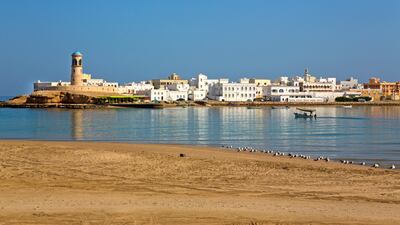Oman is set to recover in 2021 from the dual impact of the Covid-19 pandemic and the collapse in oil prices last year. The economy is projected to grow by 2.5 per cent after a contraction of 2.8 per cent in 2020, the International Monetary Fund said on Sunday.
The economic recovery will be led by 1.5 per cent growth in non-oil activity this year, compared to a 3.9 per cent contraction in 2020, the Washington-based fund said. Real oil gross domestic product is forecast to rebound by 3.5 per cent, after shrinking by 1.7 per cent in 2020.
"The economy is set to recover in 2021, with non-hydrocarbon GDP growth of 1.5 per cent as vaccine roll-out gradually restores domestic activity along with the recovery of external demand," the IMF said. "Oil production is projected to increase after the current Opec+ agreement expires in April 2022."
The sultanate has adopted various fiscal measures over the past year to support the economy during the pandemic, including interest-free emergency loans, tax and fee reductions and waivers, the flexibility to pay taxes in instalments and a Job Security Fund to support citizens who lost their jobs.
The fiscal deficit and government debt, which rose sharply in 2020, are projected to improve considerably over the medium term as the Omani authorities implement the Medium-Term Fiscal Balance Plan, the IMF said.
The fiscal deficit, which widened to 19.3 per cent of GDP in 2020, is projected to decline to -2.4 per cent in 2021 and become a surplus in 2022, the fund said.
Central government debt, which rose to 81.2 per cent of GDP in 2020, is expected to reduce to 70.7 per cent of GDP in 2021 and decline sharply over the medium term, it said.
Fiscal consolidation and higher oil prices are projected to narrow the current account deficit to -6.2 per cent in 2021 and -0.6 per cent in 2026.
A strong roll-out of vaccinations, higher oil prices and continued implementation of structural reforms would considerably improve Oman's economic outlook, the IMF said.
However, the fund cautioned that the outlook is clouded by "substantial uncertainties" arising from the pandemic.
"Covid-19 variants would prolong the impact of the pandemic. Tighter global financial conditions could worsen the fiscal and external positions. Public debt remains vulnerable to risks, particularly from oil market developments and shocks to GDP growth, the exchange rate, primary balance and interest rates," the IMF said.
The IMF's executive directors emphasised that Oman's macroeconomic policies should "remain supportive until the recovery is fully entrenched" and highlighted the need to provide additional time-bound and targeted policy measures for hard-hit sectors and households, if needed.
The directors also welcomed the authorities’ strong commitment to implementing the Medium-Term Fiscal Balance Programme to contain expenditure, reduce the dependency of revenue on hydrocarbon prices and reduce debt.
The IMF directors agreed that the exchange rate peg remains an "appropriate policy anchor" for Oman, helping to deliver low and stable inflation.
They welcomed the continued resilience of the financial sector and continuing capital market reforms.
"While the banking system remains sound, continued vigilance is required to contain financial stability risks given the substantial uncertainties in the outlook," the IMF said.
Directors also welcomed recent progress in structural reforms aiming at boosting the non-hydrocarbon sector growth and supporting external sustainability.
"Priority should be given to improving flexibility in the labour market, promoting employment in the private sector and further encouraging female labour participation," the IMF said.
The comments came after the IMF executive board concluded the 2021 Article IV consultation with Oman.


